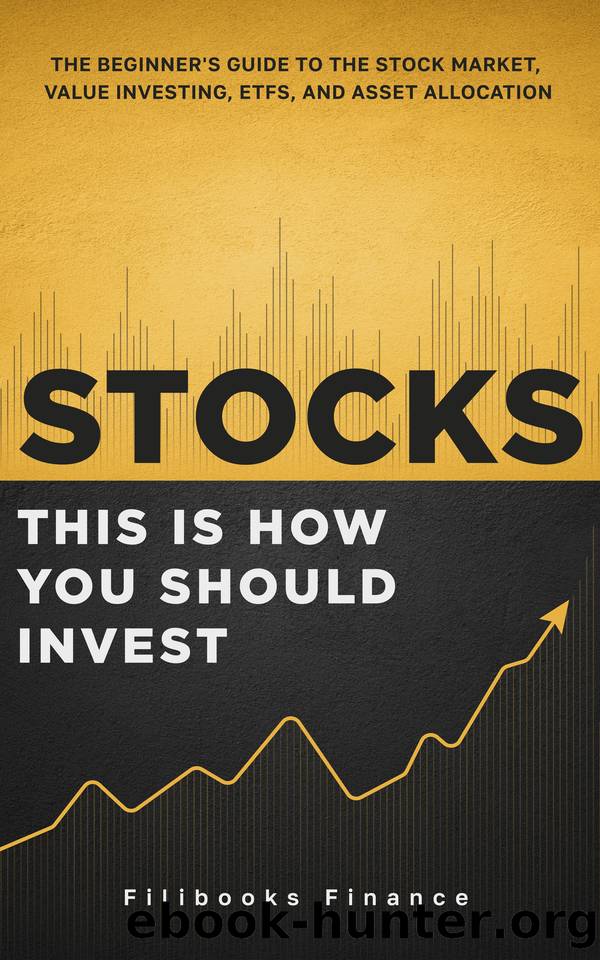Stocks: This Is How You Should Invest | The Beginner's Guide to the Stock Market, Value Investing, ETFs, and Asset Allocation by Filibooks Finance

Author:Filibooks Finance [Filibooks Finance]
Language: eng
Format: epub
Publisher: Filibooks
Published: 2020-10-20T16:00:00+00:00
Undue risk
Taking undue risk can really sink an investor. But what is undue risk?
One answer is that itâs risk you donât need to take to achieve the returns you want. If your investment objective is to grow your funds steadily by 8 percent a year, you donât need to chase after penny stocks and tech start-ups. You can easily get that sort of return by picking quality mid-caps with a good track record.
Another answer is that you can avoid undue risk by always investigating and quantifying the downside risk as well as the upside potential of any investment you want to buy. Of course, technically the downside risk of buying a share is 100 percent (the company that you have invested in can go out of business and you can lose your entire investment): however, in practice youâll rarely encounter such a loss. I have done so three times in my entire investment career, and I must have bought and sold hundreds of different shares. (One of them, by the way, was a case of financial fraud, and I had no way of detecting it; the others were in video games and mining, two sectors that are full of traps, but I blame myself for not taking an exit much earlier. I could have done so, but hung on in a classic example of what Peter Lynch calls âwatering the weedsââsee below.)
For example, letâs consider a potential recovery stock, Anheuser-Busch (BUD). Itâs one of the worldâs largest brewers, with operations in the US, South America, Europe, Asia, and Africa. The company was hit by the coronavirus crisis as bars and restaurants closedâthough of course some customers ordered beer to drink at home, so things werenât by any means as bad as they were for the hotel and airline sectors. Should I buy BUD now?
April volumes were down 32 percent, so we can probably guess that in the near term revenues will be hit by about a third. However, that does seem to be the worst impact, and while those sales wonât come backâno oneâs going to hold a St Patrickâs parade in Octoberâitâs likely that recovery will be reasonably rapid.
Anheuser-Busch hasnât been the best investment in the sector. Shares had already slipped from over $120 in 2017 to around $70 in early 2020, reflecting the fact that craft beer was taking a bigger share of the market from mainstream beers like Budweiser and Stella Artois. The company had also cut marketing spending, which puts earnings up short-term but isnât always a good idea long-term.
However, the health crisis pushed the shares down as low as thirty-five dollars in March 2020, an all-time low. Theyâve bounced a bit; now in (summer 2020) theyâre trading around fifty-five dollars. Should I buy?
The potential upside is, I think, recovery close to 2021âs original estimates as long as thereâs not a second wave of coronavirus. This yearâs earnings could be anythingâbut I think the market doesnât care about 2020 any more. The company has bought into
Download
This site does not store any files on its server. We only index and link to content provided by other sites. Please contact the content providers to delete copyright contents if any and email us, we'll remove relevant links or contents immediately.
| Analysis & Strategy | Bonds |
| Commodities | Derivatives |
| Futures | Introduction |
| Mutual Funds | Online Trading |
| Options | Portfolio Management |
| Real Estate | Stocks |
Rich Dad Poor Dad by Robert T. Kiyosaki(6613)
Pioneering Portfolio Management by David F. Swensen(6291)
How To Win Friends and Influence People by Dale Carnegie(4506)
The Money Culture by Michael Lewis(4198)
The Dhandho Investor by Mohnish Pabrai(3760)
The Wisdom of Finance by Mihir Desai(3735)
Liar's Poker by Michael Lewis(3442)
Fooled by Randomness: The Hidden Role of Chance in Life and in the Markets by Nassim Nicholas Taleb(3112)
The ONE Thing by Gary Keller(3067)
The Intelligent Investor by Benjamin Graham Jason Zweig(3037)
Mastering Bitcoin: Programming the Open Blockchain by Andreas M. Antonopoulos(3036)
The Psychology of Money by Morgan Housel(2988)
Rich Dad Poor Dad: What The Rich Teach Their Kids About Money - That The Poor And Middle Class Do Not! by Robert T. Kiyosaki(2955)
Investing For Dummies by Eric Tyson(2950)
How to Day Trade for a Living: Tools, Tactics, Money Management, Discipline and Trading Psychology by Andrew Aziz(2947)
How to Win Friends and Influence People by Dale Carnegie(2912)
Market Wizards by Jack D. Schwager(2699)
How to Pay Zero Taxes, 2018 by Jeff A. Schnepper(2647)
Zero Hour by Harry S. Dent Jr. & Andrew Pancholi(2646)
